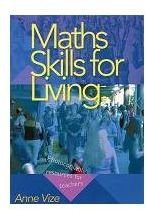Developing Life Skills and Money Lesson Plans: Easy Math Lessons for Special Ed
Who Is at Risk?
Some of our students in special education are particularly at risk in today’s highly competitive, money focused society. There is a focus on the need for buyers to beware and to take responsibility for their own actions. Sure, there is legislation which protects and acts to keep consumers safe from illegal actions.
But there is also a gap wide enough to drive a truck through which means some young people are able to function perfectly well in day to day activities, but are at risk when it comes to major financial decision making, particularly if they do not have a money savvy parent, guardian or advocate in their corner. These students can fall prey to money lending practices which are all too common, if life skills money lesson plans do not incorporate financial management skills from an early age.
This includes students who:
- Have a mild intellectual disability
- Have a learning disability
- Have a developmental delay
- Are unable to read and write in English
- Have an acquired brain injury
- Have a mental illness
- Have a speech or language disorder
- Are unable to perform calculations and understand financial transactions
- Have a disability or condition which fluctuates in its manifestations from day to day
What Are They at Risk Of?
There are many young people who leave school highly at risk of:
- Signing a contract they cannot read
- Signing a contract they do not fully understand
- Not having an advocate, parent or guardian with them to provide advice when they make a major financial decision
- Being preyed upon by unscrupulous money lenders
- Agreeing to contracts or loans because of spontaneous, impulse driven decisions
Math teachers are in a unique position to create lesson plans that build student knowledge so that special ed learners do not suffer in later life from money lending practices which do not have their best interests at the core.
What Can We Do as Teachers?
Teachers are able to take some actions to support students in these categories. We can:
-
Ensure money management skills are part of the math curriculum for special needs learners. Focus on money skills lesson plans which involve coin and note recognition, simple transactions, handling money, personal safety, reading prices and sales signs, checking change, asking for further information and paying via cash, credit card or check.
-
Talk to families, parents, guardians and advocates (where appropriate) about the need for a special ed learner to have support and advice when making financial decisions.
-
Invite expert speakers to talk to parent groups about issues related to guardianship, power of attorney, and financial planning.
-
Use concrete, explicit examples of ‘high risk’ money lending practices.
-
Teach the skill of making planned, considered purchases rather than impulse buying.
-
Teach assertive communication skills.
-
Encourage the practice of asking questions and ensuring complete understanding before signing any document.
-
Provide samples of simple forms and documents for students to practice saying ‘I need to have someone I trust read this with me before I sign it’ - practice this through role plays in class as well as in supported community situations.
-
Use role plays and drama to develop assertiveness skills - use ‘I’ statements and strong body language: Learn more about communication skills here!
So at your next math team meeting suggest that you all work together to plan life skills money lesson plans which will benefit your special ed learners, work on creating some curriculum which caters to special needs learners and helps them avoid the worst traps of money lending, with some carefully thought out math lesson plans and curriculum directions.
About the Author
Anne Vize is an Australian author, and has published two books on math skills for learners with special needs: Maths Skills for Living and Maths Skills for Working. They are published through Phoenix Education.
